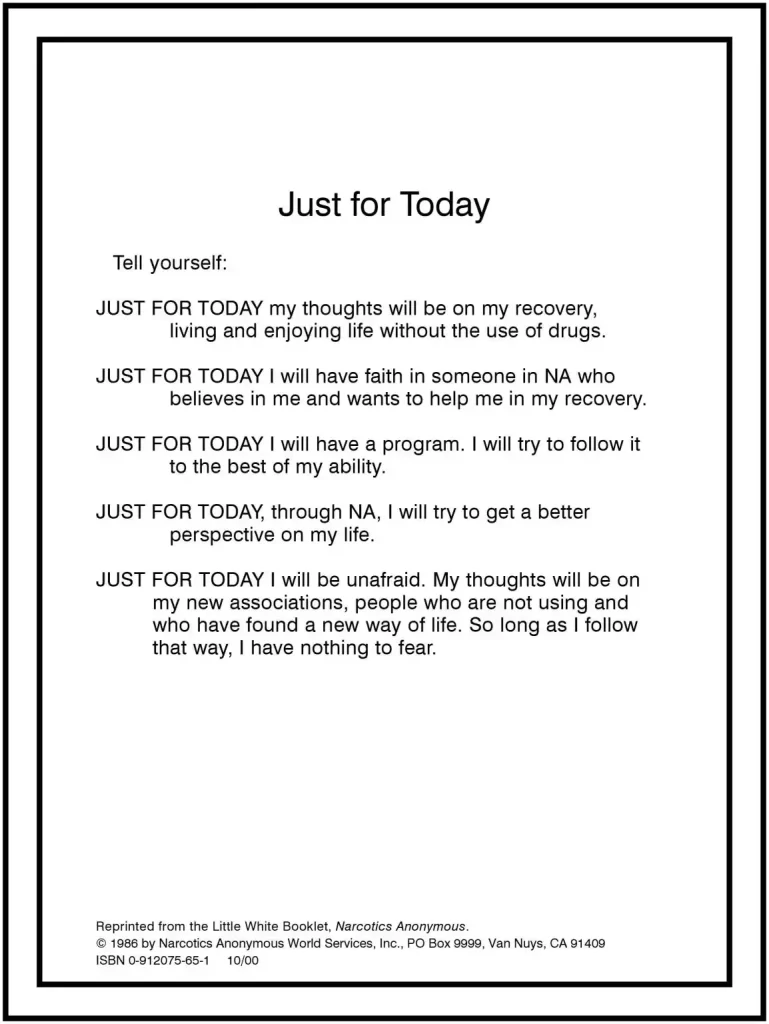Just For Today Reading: Inspiring Words for Your Healing Journey!

Table of Contents
ToggleHave you ever woken up feeling like the world is pressing down on you? During recovery, especially from addiction, it can be difficult to stay focused. The struggle may seem overwhelming to handle. A great tool to ease your burden is the “Just For Today” reading or exploring powerful Karma Narcissist sayings. This critical practice is a key part of programs like Narcotics Anonymous (NA) and Alcoholics Anonymous (AA). It provides daily reflections that help us stay focused, one step at a time.
What are these daily reflections, and how can they support someone on the path to recovery? Let’s explore how “Just For Today” readings can serve as a light of hope in healing and personal growth.
Also explore- What motivates people to struggle for change!
What is the “Just For Today” Reading?
Definition
The “Just For Today” reading is a brief daily thought that helps people in recovery stay focused on Today. Rather than fretting over what has happened or being anxious about what’s to come, these readings encourage us to focus on Today. This practice helps people in recovery focus on their goals and maintain their sobriety.
Why Daily Reflections Matter
A daily reading is a gentle reminder. It helps us stay in the present by making us aware of our thoughts and sensations. It’s a little break to think about what’s important to you each day. It’s easy to get caught up in diversions, doubts, or cravings without it.
Why “Just For Today” is Important
Thinking about the concept of “just for today” makes the process of recovery feel easier. Thinking about staying sober forever can feel overwhelming. But what if we focus on just today? That’s possible. This daily reminder makes things easier, helping recovery feel less like a never-ending climb.
Historical Background of “Just for Today”
TThe “Just for Today” concept originated in the early 20th century, especially within the recovery communities of Narcotics Anonymous (NA) and Alcoholics Anonymous (AA). These programs were founded on the principle of taking life one day at a time, a revolutionary approach that made the daunting task of lifelong sobriety more manageable.
This methodology was groundbreaking. IIt provided a simple way for people to address their addictions without the stress of thinking about staying sober forever. The “Just for Today” mantra assists individuals in maintaining present-moment awareness. This method makes it simpler to face the challenges of recovery.
The idea behind this mantra is to focus on the present day by making positive choices that contribute to overall well-being. This approach helped reduce anxiety about the future and regrets about the past, which promoted a sense of calm and control.
The Philosophy Behind “Just for Today”
The concept of “Just for Today” emphasizes mindfulness and encourages individuals to enjoy the present moment. It helps people focus on today and make good choices for their well-being.
This way helps lessen worries about what’s ahead and regrets from what’s behind, creating a feeling of calm and control. By taking the recovery journey one day at a time, people can enjoy small wins and create a solid base for lasting sobriety.
The Role of Daily Readings in Recovery
Mindfulness and Sobriety
Mindfulness is the practice of being present and aware without making judgments about anything. Reading the book daily helps build the necessary mindset for recovery. Pay attention to how you feel, what you do, and what’s around you, enabling you to stay in control, especially when cravings or urges arise. It helps you to make thoughtful choices instead of acting on impulse.
Supportive Structure for Recovery
The road to recovery can be full of surprises. Daily readings provide individuals with emotional and spiritual support consistently. These ideas are a foundation that helps people in recovery stay strong no matter what problems they face.
Benefits in Real Life
Let’s discuss how these ideas affect our lives. Imagine waking up feeling a bit stressed about what lies ahead. You could read a “Just For Today” reflection about letting go of control or accepting your current place in your journey. A simple read can change your thinking and significantly affect how you face your day. Many people in recovery say that their daily reflections help them stay focused and prevent relapse.
Key “Just For Today” Readings and Prayers
Narcotics Anonymous (NA) “Just For Today” Prayer
The NA “Just For Today” prayer is about letting go and trusting a higher power while living in the present. Every day is a chance to focus on the present, as each day of sobriety represents a significant step forward. The prayer reminds us of the strength we have now. It helps us feel thankful and grow spiritually.
Alcoholics Anonymous (AA) “Just For Today” Prayer
The AA “Just For Today” prayer conveys a similar message. It shows how important it is for individuals to make good decisions and to live in the present moment. People in AA need this prayer greatly. It helps them stay focused on getting better each day. It’s about staying calm instead of worrying about what has happened or what could happen in the future.
Adding Daily Prayer and Reflection
The strength of the “Just For Today” reading lies in both the words themselves and your personal connection to them. Begin your day with a brief prayer or reading highlighting what matters most Today. Choosing a reading from NA or AA can help you find your center. It’s a way to be present that can be as easy as saying a prayer before you get out of bed or enjoying a few quiet moments with your morning coffee.
Example Prayers and Readings
Here are some examples:
“Today, I will not think about what’s ahead.” I will concentrate on being here now and taking the next right step.
“I accept that I am not perfect, and today, I will choose to make progress instead of aiming for perfection.”
These prayers are meant to be brief, understandable, and practical too. They help start your day right and give you a guide to follow if you feel lost.
Daily Meditation and Reflection Practices
NA Daily Meditation “Only For Today”
Meditation enhances the effectiveness of the “Just For Today” reading by providing us with time to reflect. For NA members, combining meditation with daily readings helps to soothe the mind and connect them with their true selves. Meditation is easy. Just a few minutes can help you find peace amid the busyness of life.
A Daily Meditation “Just For Today”
Daily meditation is a crucial part of recovery for AA members. Meditation helps you focus on the present and clears your mind. It works nicely with the “Just For Today” reading, which gives individuals a chance to stop and think about what they really want to do that day.
Benefits of Daily Meditation
Meditating daily helps people feel less stressed, better control their cravings, and think more clearly. It’s like starting fresh in your mind. Meditation helps many people in recovery handle their feelings and challenges. The practice makes their journey to recovery easier and more manageable.
The Role of Support Systems

Pic credit: Instagram
Importance of Community and Fellowship
Community and fellowship play a crucial role in the recovery process. Being part of a supportive community gives individuals a sense of belonging and accountability. Support groups, such as Narcotics Anonymous (NA) and Alcoholics Anonymous (AA), provide a safe space for individuals to share their experiences, receive encouragement, and learn from others who have faced similar challenges. The sense of camaraderie and mutual support can be incredibly motivating and reassuring.
Building a Strong Support Network
Building a strong support network involves identifying and connecting with individuals who can offer encouragement, guidance, and accountability. This network may include family members, friends, sponsors, and fellow group members.
It’s important to communicate openly and honestly with these individuals, express their needs, and seek support when necessary. Regularly attending meetings, participating in group activities, and maintaining open lines of communication can help to strengthen these relationships
Accessing and Organizing “Just For Today” Readings
Finding “Just For Today” Readings
NA and AA offer “Just For Today” readings in various formats. You can find them in books, PDFs, or even apps. Websites like NA.org and JFTNA.org provide daily reflections, offering free and paid versions. Many people prefer having access to these readings on the go, which is why the digital format is so popular.
Downloading NA and AA Readings
You can find many resources online if you are looking for “Just For Today” readings in PDF format. NA and AA offer free downloads of their daily readings. If you need a PDF in English, Spanish, or Hindi, you can usually find an option that fits your language needs.
How to Organize Kindle Library for Daily Recovery Readings
Keeping recovery readings & managing on Kindle can simplify life for those who love technology. Create a collection specifically for recovery materials. You can easily find your daily reflections and prayers at NA, AA, or other sources. You can download a whole library of daily meditations and have them ready whenever needed.
Why You Should Make Separate Folders or Collections
Making folders or collections on your Kindle might help you keep your things in order. It helps you discover your daily readings, even when you’re busy. Set up a place for reading about recovery, a place for meditation, and a place for prayer.
How to Help by Organizing Your Kindle Library
You make a practice of organizing your Kindle every day. It helps you keep to your recovery practices by making sure your readings are always just a tap away.
Download the free “Just For Today” PDF for NA and AA.
Are you searching for a free PDF? Refer to the websites listed above for free “Just For Today” readings in different languages. It is an excellent tool for people who enjoy reading without being online.
Practical Tips on How to Use “Just For Today” Readings
Making a Goal for Each Day
Before you read, consider what you need today, similar to the previously mentioned meditations. Having a defined goal or purpose helps you better understand what you read and gives your day a sense of direction. It’s like having a map to help you become better.
Setting up a schedule
Read your “Just For Today” reflection every day, either in the morning or during your midday break. It is vital to stay constant. A routine helps you stay on track with your recuperation, so reading becomes a calming habit.
Reading with a Group
Sometimes, reading together can be special. Reading together in an NA or AA group can help you understand more. It brings people together and lets them share their views, making the reflection deeper.
Everyday Habits for “Just for Today”

Pic: Pinterest
Morning Affirmations and Intentions
Beginning the day with positive thoughts and clear goals can greatly influence our feelings. Morning affirmations are simple, positive phrases that individuals repeat to themselves to foster a positive mindset.
Some examples of morning affirmations include “I am strong,” “I can overcome challenges,” and “I deserve love and respect.” Setting daily intentions involves selecting specific goals or actions to focus on throughout the day. These could be things like being thankful, staying sober, or lending a hand to someone in need.
Ways to Practice Mindfulness and Meditate
Mindfulness and meditation help you remain present and focused. Mindfulness means focusing on the present moment without judgment. Meditation is a technique that helps relax the mind and reduce stress.
Deep breathing, body scans, and guided imagery can help individuals feel calm and focused throughout the day. Practicing mindfulness and meditation regularly can help you manage your emotions, lower anxiety, and boost your overall well-being.
Self-Reflection After Each Reading
After you read, take a moment to reflect on how the lesson applies to your life. Think about putting down your thoughts in a notebook or talking to a friend about them. This activity helps you understand the reading better and reinforces what you learn from it.

Pic: Pinterest
Overcoming Common Challenges
Dealing with Cravings and Triggers
Cravings and triggers are common challenges faced during the recovery journey. Cravings are intense desires to use substances, while triggers are situations, people, or emotions that prompt these cravings.
Developing strategies to cope with cravings and to avoid triggers is essential for maintaining sobriety. Techniques such as distraction, seeking support, and practicing mindfulness can help individuals effectively manage their cravings. Identifying and avoiding triggers, or developing healthy responses to them, can also reduce the risk of relapse.
Managing Stress and Emotional Ups and Downs
Stress and emotional fluctuations are inevitable parts of life; however, they can be particularly challenging for individuals in recovery. Developing healthy coping mechanisms is essential for effectively managing stress and emotional fluctuations.
Techniques such as exercise, journaling, deep breathing, and engaging in hobbies can help reduce stress and improve mood. Seeking support from a therapist or counselor can also provide valuable tools and strategies for managing emotional ups and downs.
Why Should You Set a Purpose for Reading?
Discovering Purpose in Recovery
When you decide what you want to gain from your reading, it transforms into something special, rather than just words on a page. When you grasp the meaning of the reading, you unlock its power. It is more than a spiritual practice—it is a way to grow.
Advantages of Intentional Reading
Reading with a purpose helps you connect more deeply with the material. It’s true! When you read with a clear purpose, you’re more likely to bring its message into your daily life. This practice lets you stay focused on your goals and supports your recovery.
Thinking About Our Actions Helps Us Grow
When you consider what you read each day, you receive a clearer message and learn from it as well. Taking time to think about yourself can strengthen your recovery and help you succeed in the long run.
Special Focus on Recovery Readings
Narcotics Anonymous Daily Recovery Readings
NA’s “Just For Today” readings are made for people working to overcome addiction. This reading gives helpful tips for staying sober and shares thoughts that inspire personal growth.
Daily Reflections from Alcoholics Anonymous
AA’s daily readings provide helpful insights and support for those on the path to recovery from alcoholism. These reflections help people focus on their recovery goals and support their emotional and spiritual well-being.
What Do Today’s Readings Mean?
These daily readings are beautiful due to their simplicity. They give you the right guidance to help you through the day ahead. Today’s reading has something important to share: overcoming fear, being thankful, or taking charge of our actions.
Popular Questions typed by Netizens related to Just for reading Today
What is the AA “Just For Today” reading?
The AA “Just For Today” reading is a daily reminder that helps people concentrate on staying sober for Today. It helps people focus on the present and remain linked to their path of recovery.
What is the NA “Just For Today” reading?
The NA “Just For Today” reading provides a daily message designed to assist individuals in their recovery journey. It promotes being present, understanding oneself, and growing spiritually, assisting people in recovery to stay focused and balanced.
Where can I get the “Just For Today” PDF?
You can find the “Just For Today” PDFs on different NA and AA websites. You can also download them for free in English, Spanish, and Hindi.
Can “Just For Today” readings be downloaded in various languages?
Of course! Many NA and AA websites offer free downloadable PDFs of “Just For Today” readings in various languages. It assists all people, regardless of where they come from, in discovering the wisdom and guidance they seek.
The many languages offered for NA and AA literature reflect a true commitment to inclusivity, going beyond mere translation. Getting better is a personal path. It usually involves strong feelings, understanding different cultures, and thinking about spiritual concepts.
Using these reflections in your native language helps you think and feel more deeply about the material. It helps create a real connection to the wisdom, keeping important details and cultural meaning intact.
This practice encourages genuine self-reflection and spiritual growth, which could be lost or weakened when engaging with content in a non-native language. Support in many languages is essential for the success and reach of 12-step programs worldwide. It helps the uplifting messages of daily reflection connect with different groups of people.
This makes recovery efforts more effective by ensuring they are very relevant to various cultures and languages. It highlights how everyone faces challenges with addiction and how recovery ideas can help all of us.
Related data table about Official Literature & Accessibility: Formats and Languages
| Organization | Publication Name | Available Formats | Languages (Examples) | Primary Access Points |
| Narcotics Anonymous (NA): | “Just For Today” | Print Book, PDF, Digital App (via 3rd party) | English, Spanish, Hindi (via NAWS), + many others | Official NAWS Website, Local NA Meetings, Online Stores, Libraries |
| Alcoholics Anonymous (AA): | “Daily Reflections” | Print Book, PDF, Digital App (via 3rd party), Online Webpage | English, Spanish, French, Hindi (via regional), + many others | Official AAWS Website, Local AA Meetings, Online Bookstore |
| Other (e.g., Hazelden Betty Ford): | “Twenty Four Hours a Day,” “Keep It Simple,” etc. | Print Book, E-book | English, Spanish (for some titles) | Publishers’ Websites, Online Retailers, Libraries |
This table is a helpful guide for anyone looking to find official daily reflection literature. It brings together information on where to find these materials from various organizations and formats, making the search easier and quicker.
The table shows that literature is available in many languages. This highlights how these recovery programs are accessible to people worldwide. This is important for people who don’t speak English or those who like to learn about recovery in their own language.
These programs help individuals understand better and feel more connected. People can take active measures toward rehabilitation when they have clear access points. Knowing where to find and how to use these important everyday tools can help you maintain your interest. This is really important for staying sober and becoming a better person over time. It lets others participate in and makes them more committed.
Relevant Data Table For The Just For Today Reading:
| Aspect | Description |
|---|---|
| Historical Background | Origins in early 20th-century recovery programs like NA and AA. |
| Philosophy | Focus on mindfulness and living in the moment. |
| Morning Practices | Affirmations and setting daily intentions. |
| Mindfulness Techniques | Deep breathing, body scans, guided imagery. |
| Support Systems | Community, fellowship, and building a support network. |
| Common Challenges | Dealing with cravings, triggers, stress, and emotional fluctuations. |
| Daily Life Integration | Setting realistic goals, creating a daily routine. |
Talks at the end
Reading “Just For Today” every day is not simply a habit; it’s an important part of your rehabilitation. It keeps you stable, clear-headed, and positive, even when circumstances go tough. You help keep your sobriety safe by focusing on now. You also help yourself grow spiritually and emotionally. Why not start today? The road may be long, but every “just for today” gets you closer to the person you want to be.
Frequently Asked Questions
How can morning affirmations and intentions benefit my recovery?
Morning affirmations and intentions can significantly improve your mindset and overall well-being. Affirmations are positive statements that you repeat to yourself to foster a positive outlook.
Examples include “I am strong,” “I am capable of overcoming challenges,” and “I am worthy of love and respect.” Setting daily intentions involves identifying specific goals or actions for the day, such as practicing gratitude, maintaining sobriety, or assisting others. These practices can help you start the day with a positive mindset, increase your motivation, and provide a sense of direction and purpose.
What are some effective mindfulness and meditation techniques?
Mindfulness and meditation are powerful tools for staying present and focused. Mindfulness involves paying attention to the present moment without judgment, whereas meditation is a practice designed to calm the mind and reduce stress. Techniques such as deep breathing, body scans, and guided imagery can help you stay grounded and centered throughout the day.
Regular practice of mindfulness and meditation can enhance emotional regulation, reduce anxiety, and improve overall well-being. These practices can be incorporated into your daily routine, providing a sense of calm and balance.
Why are community and fellowship important in recovery?
Community and fellowship are crucial to the recovery process. Being part of a supportive community provides individuals with a sense of belonging and accountability. Support groups, such as NA and AA, offer a safe space for you to share your experiences, receive encouragement, and learn from others who have faced similar challenges.
The sense of camaraderie and mutual support within the community can be incredibly motivating and reassuring. Building a strong support network involves identifying and connecting with individuals who can provide encouragement, guidance, and accountability.
How can I manage cravings and triggers effectively?
Cravings and triggers are common challenges in the recovery journey. Cravings are intense desires to use substances, while triggers are situations, people, or emotions that prompt these cravings. Developing strategies to cope with cravings and avoid triggers is essential for maintaining sobriety.
Techniques such as distraction, seeking support, and practicing mindfulness can help you effectively manage cravings.
Identifying and avoiding triggers, as well as developing healthy responses to them, can also reduce the risk of relapse. It’s important to have a plan in place and seek support when needed.
Post References:
Just for Today in Narcotics Anonymous – …
NA Just For Today – January – Bluidkiti’s Alcohol and Drug …


